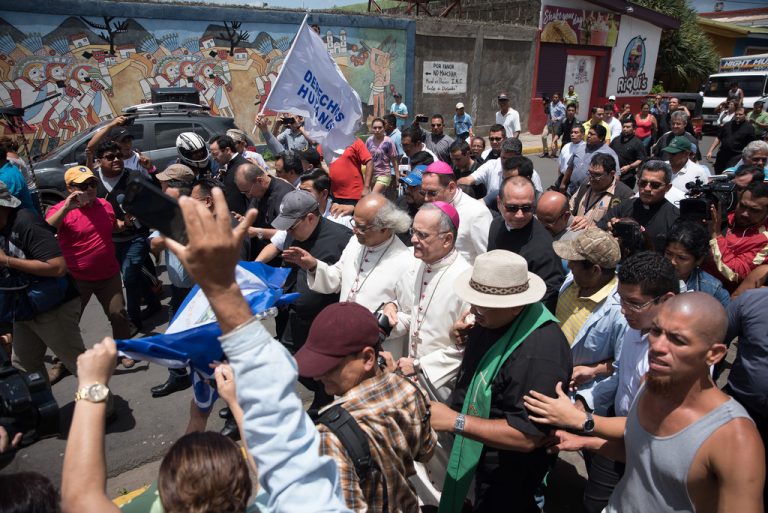21 de julio 2018

Children of Exile: The Births “Sowing Hope” in the Camp of Nicaraguan Farmers

PUBLICIDAD 1M
PUBLICIDAD 4D
PUBLICIDAD 5D
A maximum severity threat calls for a maximum solidarity response, and the entire nation’s overwhelming reaction

The bishops surrounded by Sandinista mobs in the city of Diriamba. Photo: Carlos Herrera / Confidencial
The vicious attack launched this July 19th by commander Daniel Ortega against the Catholic church’s Episcopal Conference bishops was intended to be the final blow to derail the country’s hope in the National Dialogue, but it’s destined to the most resounding failure.
Despite the provocations from the regime and the attacks on churches and themselves, the bishops have expressed that they will not abandon their prophetic mision alongside the massacred people, as witnesses and mediators at the Dialogue to facilitate a peaceful political solution. This is the main guarantee that in spite of Ortega, the Dialogue will prevail and the bishops won’t ever leave a vacuum for him to replace them with his unconditional machinery of political manipulation.
Ortega spoke in the plaza with arrogance and contempt, like an emboldened General who had just won a bloody military campaign, when everybody knows that his paramilitary groups fought against nonexistent armies in La Trinidad, Lóvago, Jinotepe, Diriamba, UNAN Managua (National Autonomous University of Nicaragua), Masaya, and Monimbó.
From the peak of his wave of terror, after massacring, persecuting and capturing hundreds of citizens in his “operation clean-up”, Ortega targeted his final onslaught towards the bishops. Speaking before his fanatical supporters at a public rally and using an abusive national television network, he accused them of being coup leaders and showed as the only “evidence” the route map towards democratization born at the National Dialogue, a proposal that includes far-reaching political reforms, a total revamping of the electoral system, and the holding of early elections in march next year.
Consequently, also the international community, starting with the Vatican, must come out in defense of the bishops. They represent the only opportunity to facilitate the path towards peace in Nicaragua, avoiding the threat of a civil war that Ortega wants to impose by all means. And although the National Dialogue is wounded by the lack of political will of the head of state, it is imperative to reinforce it with the backing of reliable international guarantors.
A president unfit to continue governing, because his hands are stained with blood with his responsibility of over 280 deaths, can not harm the bishops’ credibility, nor make a dent in the moral integrity of the Episcopal Conference. During the eleven years of his institutional dictatorship, before it evolved into a repressive and bloodthirsty regime, Ortega could never co-opt or divide the bishops. At his unconditional service, Cardinal Miguel Obando y Bravo was always blessing the policies of the regime, to the extreme that he was even proclaimed a national hero. But the bishops never bowed down. They were preserved as the nation’s moral reserve, and during these months of civic rebellion gave a solid testimony of courage, and of their christian commitment to the truth and to the victims.
From the arrogance of a messianic power, that pathetically presents the presidential couple as the anointed ones from god, Ortega tried to disqualify the bishops, but what he did was disqualify his own leadership as a counterpart of the National Dialogue and as an eventual participant in the political transition. His resignation from the presidency today is even more urgent than before, to facilitate the reforms that lead to the establishment of justice, democracy and peace in Nicaragua.
Archivado como:
PUBLICIDAD 3M
Periodista nicaragüense, exiliado en Costa Rica. Fundador y director de Confidencial y Esta Semana. Miembro del Consejo Rector de la Fundación Gabo. Ha sido Knight Fellow en la Universidad de Stanford (1997-1998) y profesor visitante en la Maestría de Periodismo de la Universidad de Berkeley, California (1998-1999). En mayo 2009, obtuvo el Premio a la Libertad de Expresión en Iberoamérica, de Casa América Cataluña (España). En octubre de 2010 recibió el Premio Maria Moors Cabot de la Escuela de Periodismo de la Universidad de Columbia en Nueva York. En 2021 obtuvo el Premio Ortega y Gasset por su trayectoria periodística.
PUBLICIDAD 3D